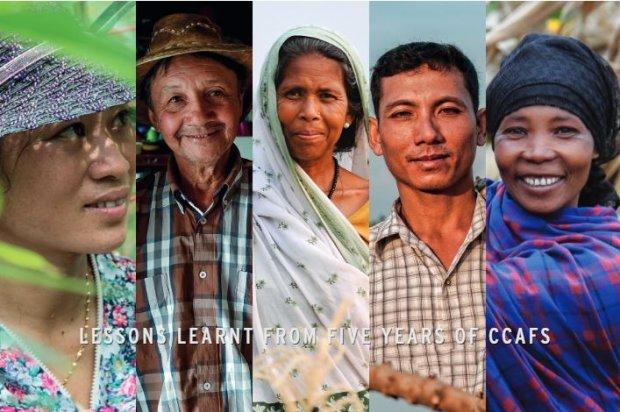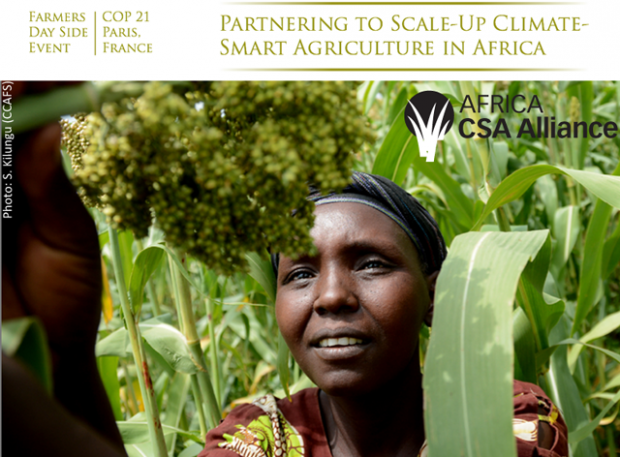What can COP21 deliver for agriculture? 8 things you need to know
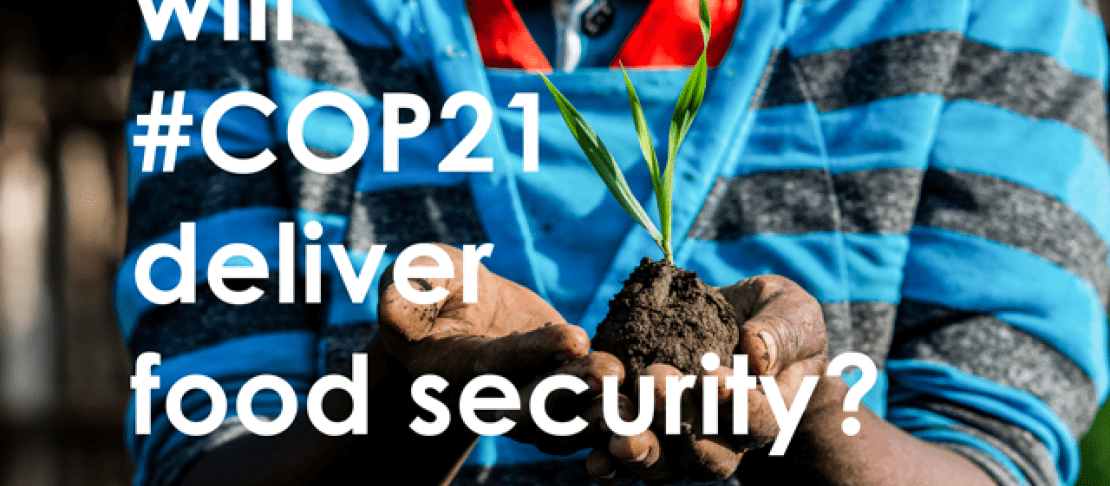
How to navigate key issues for food and farming at the Paris climate talks.
To secure the future of food and farming, a 2015 climate agreement should reference food security and provide the financial, technical and capacity building support for countries to devise ambitious actions for the agricultural sector. This is according to experts from across CGIAR in a new analysis, Progress on Agriculture in the UN Climate Talks: how COP21 can ensure a food secure future.
But how likely is this outcome, and what is the situation going into the next two weeks of climate negotiations in Paris? Here are 8 key things you need to know if you’re a food or farming advocate:
Agriculture does not appear in the draft negotiating text, though food security is mentioned. Yet a new agreement can open the door to action on food security and agriculture. But there is reason to be optimistic about progress after Paris, because…
- Countries are leading the way by including action on agriculture in their Intended Nationally Determined Commitments (INDCs). Countries were asked to submit ‘blueprints’ for national action before the conference. Our recent analysis finds a vast majority of country-level climate plans prioritise agriculture: 80% have included agriculture in climate change mitigation targets or actions and 64% have noted agriculture’s importance in climate adaptation strategies. This offers opportunities for progress at the national level on mitigation and adaptation, despite the sector’s slow progress in the UN negotiations.
Will these pledges be enough to deliver food security for billions of people and reduce agriculture’s climate change footprint? Join CCAFS and partners at the Global Landscapes Forum for an in-depth discussion on this topic 6 December 2015, 09:00-13:15: From farmer’s fields to landscapes: Food security in a new climate regime?
Climate finance should include agriculture as a key sector for INDC implementation support. The prominence of agriculture in the INDCs reveals a huge appetite for technical assistance and climate finance for adaptation and mitigation strategies related to agriculture. But funding for implementing INDCs, and particularly for implementing climate-smart agriculture, is far from secure. “This should serve as a wake-up call for climate negotiators, to make sure sufficient financing is released to support agriculture initiatives,” commented Meryl Richards, who led the CCAFS analysis of country plans.
Business and civil society must also take action on agriculture: last year at COP20 in Lima, the French government challenged businesses, civil society and other non-state actors to launch new initiatives that could showcase climate solutions and ‘inspire and motivate political leaders to be more ambitious’. Several large-scale initiatives that address agriculture will be launched at “Agriculture Action Day” on 1 December under the Lima-Paris Action Agenda (LPAA). CGIAR will help implement and support initiatives that ensure agriculture plays its part in climate change adaptation and mitigation under the UNFCCC process.
This includes joining the 4/1000 Initiative: Soils for Food Security and Climate, led by a coalition of French research agencies. Designed with ambitious targets to restore soils and soil carbon, the initiative is a good example of how both mitigation and adaptation can be synergistic. CGIAR will also act as scientific partner and critical friend to the World Business Council on Sustainable Development’s work on climate-smart agriculture under the LPAA.
Countries and observers must seize the opportunity to influence a future global decision on agriculture in 2016: While agriculture is not explicitly on the agenda in Paris, countries and observers to the UNFCCC have until 9 March 2016 to make submissions on agriculture. This follows a decision made at the June 2014 meeting of the UNFCCC’s Subsidiary Body for Scientific and Technological Advice (SBSTA), to accept submissions and hold workshops on agriculture in June 2015 and June 2016. Now is the time for countries and observers to prepare their submissions on the identification of adaptation measures, and identification and assessment of agricultural practices and technologies to enhance productivity in a sustainable manner. This work should ultimately enhance knowledge for the package of new approaches following COP21.
Find out more about how to engage in SBSTA with our Toolkit to the UNFCCC Negotiations on Agriculture

 Successful large-scale initiatives already exist, and should inspire action. There is plenty of evidence that investing in sustainable agriculture can deliver benefits for climate change adaptation, economic development and food security, and reducing greenhouse gas emissions. We recently outlined six essential steps needed to make this happen, including putting the right technology into farmers’ hands, getting farmers insured, and delivering climate forecasts directly.
Successful large-scale initiatives already exist, and should inspire action. There is plenty of evidence that investing in sustainable agriculture can deliver benefits for climate change adaptation, economic development and food security, and reducing greenhouse gas emissions. We recently outlined six essential steps needed to make this happen, including putting the right technology into farmers’ hands, getting farmers insured, and delivering climate forecasts directly.
Download the booklet: Six steps to success. How to make 500 million farmers climate-resilient while also reducing their agricultural emissions. Lessons learnt from 5 years of CCAFS.
Want to find out more? Join our event on 4 December (14:00 - 15:30): Scaling up innovative approaches to climate-smart agriculture in Africa
Innovative partnerships are the heart of positive change: there has been plenty of action across Africa, for example, from piloting policies to the creation of institutions, in order to support grass-root scaling-up of climate-smart agriculture (CSA). All kinds of actors must play their role, including civil society, regional political bodies, research institutes and the private sector.
Learn more on 2 December 2015, 15:00-16:30 (part of Farmers Day): Partnering to scale-up climate-smart agriculture in Africa: from policy to tangible impact.
Gender and youth issues must be considered in the discussions on agriculture. Climate change will add to the challenges that vulnerable and poor women face, and youth are the farmers are tomorrow. As outlined in our toolkit on Agriculture in the UNFCCC negotiations, Gender and youth are currently mentioned under the preamble section of the draft Agreement, but given the cross-cutting nature of both topics, these cannot be limited to a Preamble. They must be woven in throughout the text and specific efforts should be made to ensure linkages to food security and agriculture. A policy brief by CCAFS and partners recommends that gender-responsive climate policies and programmes include:
A gender component as a qualifying criterion to access international funding.
Design that is informed by needs assessments that distinguish women’s and men’s needs and priorities.
Monitoring and assessment indicators of real change in gender and social inclusion.
Learn more about gender issues at the Global Landscapes Forum on 6 December:
- At the Gender Pavilion from 14:50-15:35: Transforming Climate Change Adaptation - Sharing lessons and best practices from gender integration.
- At our side event from 12:15 - 13:00 Panel discussion: Gender, youth, the INDCs, and food security
JOIN THE CONVERSATION
If you’re in Paris: Click for the full list of CCAFS events at COP21
Follow online: If you're not in Paris you can follow our blog, Twitter, LinkedIn, Periscope or Facebook for updates.
We're all set up at #COP21 in Paris. Join our events and come say hello https://t.co/VDAY7gVRcv pic.twitter.com/jhjuccucBa
— CCAFS cgiarclimate (@cgiarclimate) November 29, 2015
KEY RESOURCES
Info note: Agriculture's prominence in the INDCs: Analysis of agriculture in countries’ climate change mitigation and adaptation strategies by Meryl Richards, Lucy Gregersen, Victoria Kuntze, Simone Madsen, Mads Oldvig, Bruce Campbell, Ioannis Vasileiou
Info note: Progress on agriculture in the UN climate talks: How COP21 can ensure a food-secure future by Merylyn Hedger, Bruce Campbell, George Wamukoya, James Kinyangi, Louis Verchot, Lini Wollenberg, Sonja Vermeulen, Peter Minang, Henry Neufeldt, Alain Vidal, Ana Maria Loboguerrero Rodriguez, Anette Engelund Friis, Alberto Millan
Policy Brief: Supporting women farmers in a changing climate: five policy lessons by Sophia Huyer, Jennifer Twyman, Manon Koningstein, Jacqueline Ashby, and Sonja Vermeulen
Toolkit to the UNFCCC Negotiations on Agriculture by Farming First, CTA and CCAFS
Press release: New Study Exposes Gap in Global Climate Policy as Countries Commit to Action on Agriculture
Vanessa Meadu is the Global Communications and Knowledge Manager at CCAFS.

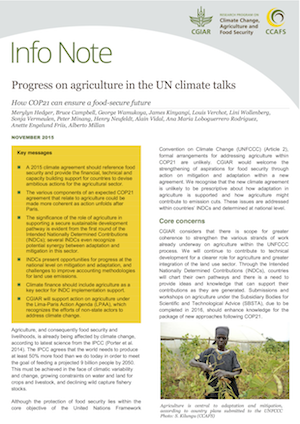
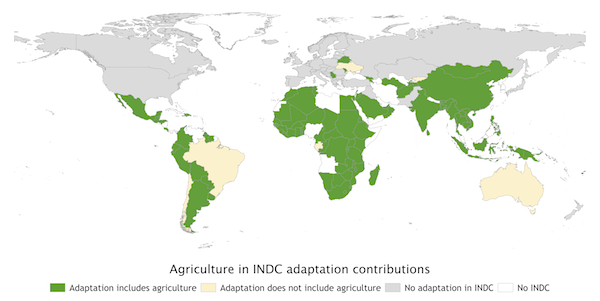
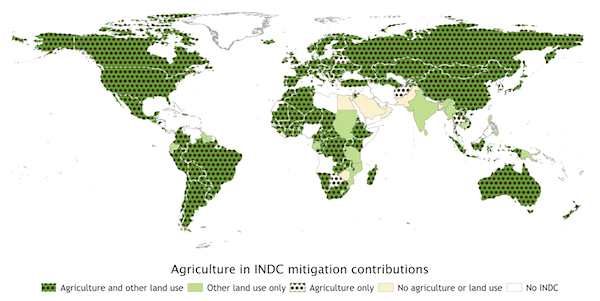
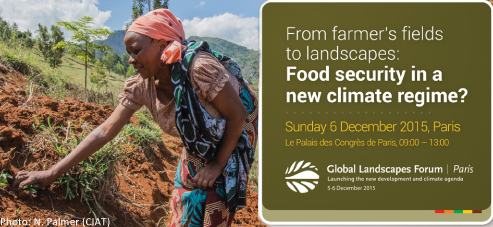
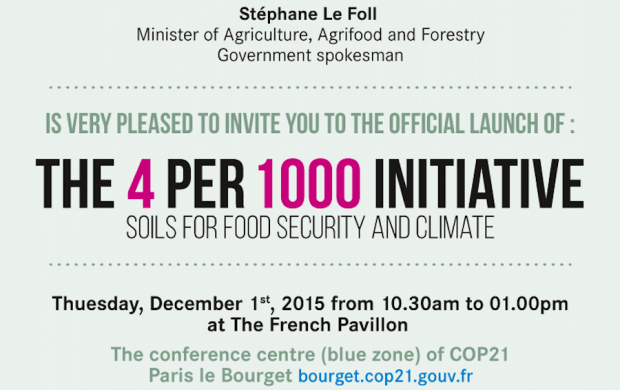

 Successful large-scale initiatives already exist, and should inspire action. There is plenty of evidence that investing in sustainable agriculture can deliver benefits for climate change adaptation, economic development and food security, and reducing greenhouse gas emissions. We recently outlined six essential steps needed to make this happen, including putting the right technology into farmers’ hands, getting farmers insured, and delivering climate forecasts directly.
Successful large-scale initiatives already exist, and should inspire action. There is plenty of evidence that investing in sustainable agriculture can deliver benefits for climate change adaptation, economic development and food security, and reducing greenhouse gas emissions. We recently outlined six essential steps needed to make this happen, including putting the right technology into farmers’ hands, getting farmers insured, and delivering climate forecasts directly.